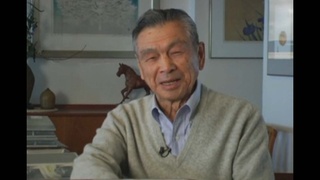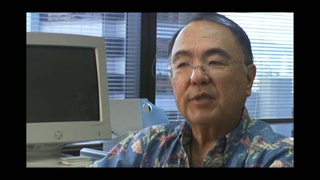Interviews
Californians didn't know about evacuation
You would think most Americans would’ve known, but even people in California didn’t know what happened to the Japanese Americans. It seemed like, you know, they disappeared. And I don’t think the American papers really played up where the Japanese were taken to and that they could only carry just what they could carry, which was very minimal. And I know people in our home town, I mean, we grew up in San Pedro. And yet, when we came back they said, “Oh! Where did you Japanese go? You all disappeared somewhere!” And, I don’t think they realized what this government had done, you know, to put the Japanese people away.
And they may have said it was for our safety, when it wasn’t so—it was almost like a punishment being Japanese and being taken in the same way as they thought of the Japanese from Japan—the enemy. We were—70 percent of us who went into camp—were Americans, I mean we were American citizens, and the rest of them were the Issei‘s born in Japan who America never allowed to be citizens.
Date: June 16, 2003
Location: California, US
Interviewer: Karen Ishizuka, Akira Boch
Contributed by: Watase Media Arts Center, Japanese American National Museum.
Explore More Videos


Less information about Hawai‘i in mainland
(b.1944) Founder of Kobayashi Group, LLC


A teenager's memories of how a local newspaper misrepresented Japanese Americans
(b. 1925) Draft resister

The role of the media in influencing people's opinions
(b. 1925) Draft resister

Reaction to a 1942 speech by Mike Masaoka, Japanese American Citizen League's National Secretary
(1915 - 2011) Nisei florist who resettled in New York City after WW II. Active in Japanese American civil rights movement

First learning about the incarceration experience in college
(b. 1955) Lawyer


Feeling angry upon reading of Supreme Court case, 'Korematsu v. United States'
(b. 1955) Lawyer

Reasons for conformity and competitiveness in Gardena, California
(b. 1946) Lawyer

Role of the redress movement in helping Nisei to open up about their wartime experiences
(b. 1946) Lawyer

Search of family home by the FBI following the bombing of Pearl Harbor
(1937 - 2021) Teacher


Not recognizing father after reunion at Crystal City, Texas
(1937 - 2021) Teacher

A child's memories of activities at Crystal City, Texas
(1937 - 2021) Teacher
